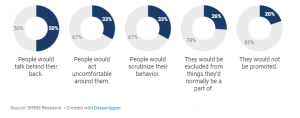- June 5, 2023
By Matt Gonzales | May 31, 2023
New SHRM research reveals that most LGBTQ+ workers perceive inclusivity and fairness at work, but findings also suggest that their companies still have a long way to go to fully embrace diversity, equity and inclusion (DE&I).
The survey of 1,887 U.S. workers and 1,045 HR professionals indicated that about 3 in 4 employees who identify as LGBTQ+ agree that they are treated fairly at work (75 percent), believe they are given equal access to opportunities and resources at work (72 percent) and rate their workgroups as inclusive (71 percent).
“There’s vast research showing the importance of perceived fairness for employee attitudes and behavior—it’s invaluable for organizations to get this right,” said Katie Merlini, senior researcher of thought leadership for SHRM. “Although most workers who identify as LGBTQ+ perceive fairness in their workplaces, we still have a good portion—at least 1 in 4—who aren’t perceiving fairness, implying there’s still work to do.”
Additional findings showed:
- LGBTQ+ employees who say their companies’ senior leaders care about making meaningful DE&I progress are more than twice as likely to agree they are treated fairly at work compared with those who don’t feel their companies’ leaders care about DE&I progress.
- About 78 percent of LGBTQ+ workers say their companies’ senior leaders care about making meaningful DE&I progress to some extent or to a great extent.
- LGBTQ+ workers who say their companies’ senior leaders care about making meaningful DE&I progress are over five times more likely to agree they have equal access to resources and opportunities at work compared with those who don’t feel their companies’ leaders care about DE&I progress.
However, a lower percentage of LGBTQ+ employees (71 percent) perceive their company as having equitable representation at all levels compared with workers who don’t identify as LGBTQ+ (78 percent).
LGBTQ+ workers who say their company has equitable representation at all levels are more than three times as likely as those who feel their companies don’t have equitable representation to agree they have equal access to resources and opportunities at work.
“Not only does representation signal that workers of various backgrounds can succeed at the organization,” Merlini explained, “but leaders who are representative of their workforce and customers are also likely to understand and meet the needs of their constituents.”
Are LGBTQ+ Employees More Comfortable Being Out at Work?
In June 2020, the U.S. Supreme Court ruled in Bostock v. Clayton County, Ga. that workplace discrimination on the basis of sexual orientation and gender identity is prohibited under Title VII of the Civil Rights Act of 1964.
While the ruling serves as a game-changer for combating bias against LGBTQ+ individuals, coming out at work remains a tough decision for many of these employees: More than 1 in 4 LGBTQ+ workers are not broadly out at work, according to a 2020 report by McKinsey and Company.
Shawnie Hawkins, the director of the Human Rights Campaign’s workplace equality program in Washington, D.C., said that many LGBTQ+ workers choose not to come out at work due to a lack of trust about what will happen if they share this information.
“It wasn’t too long ago in our nation’s history that people were fired for their sexuality,” Hawkins said. “[Employers] must do more with creating more-inclusive workplaces where employees feel safe sharing their information.”
While the SHRM research indicates that most surveyed LGBTQ+ employees are out at work, those who chose not to disclose this information alluded to several reasons why:
- Half feel it is somewhat or very likely that people would talk behind their backs.
- 1 in 3 believe it is somewhat or very likely that people would act uncomfortable around them.
- 1 in 3 feel it is somewhat or very likely that people would scrutinize their behavior.
- About 1 in 4 feel it is somewhat or very likely that they would be excluded from activities they’d normally be a part of.
- 1 in 5 believe they would not be promoted.
“These data suggest stigma and discrimination on the basis of LGBTQ+ identity are still concerns in workplaces,” Merlini added. “Employers can act here to foster greater equity and inclusion for workers in the LGBTQ+ community.”
Common Reasons for Not Coming Out at Work
While most employees have disclosed this aspect of their identity, many choose not to.
Of LGBTQ+ workers who haven’t disclosed, the most common concerns about disclosing are:

Supporting an Inclusive Space for LGBTQ+ Employees
Hawkins said employers should strive to create inclusive environments for LGBTQ+ workers, allowing them to feel more comfortable being their authentic selves in the workplace. She noted that organizations can do this by making sure their employees feel seen and included in workplace policies and best practices.
“It’s a very important part of a workplace culture that’s intentional about creating inclusion for all,” she said. “Show up for your employees and their families [and] show support in the communities you serve.”
Incorporating LGBTQ+ identities in DE&I efforts, such as in diversity training or hiring objectives, can be an effective way to enhance DE&I within organizations and create an inclusive workplace for these employees, the SHRM research suggested.
Companies that specifically include LGBTQ+ identities in their DE&I efforts to some extent or to a great extent are over four times more likely than those that do not include them to rate their organizations’ DE&I efforts as mostly to extremely successful.
“Our findings suggest more can be done to support LGBTQ+ workers, such as creating inclusive, psychologically safe work environments,” Merlini said. “LGBTQ+ identities must be a part of DE&I conversations and, more importantly, DE&I-related actions.”
To view the original article posting, click here.

